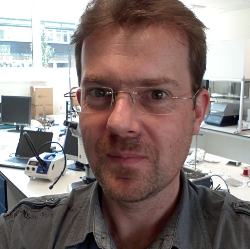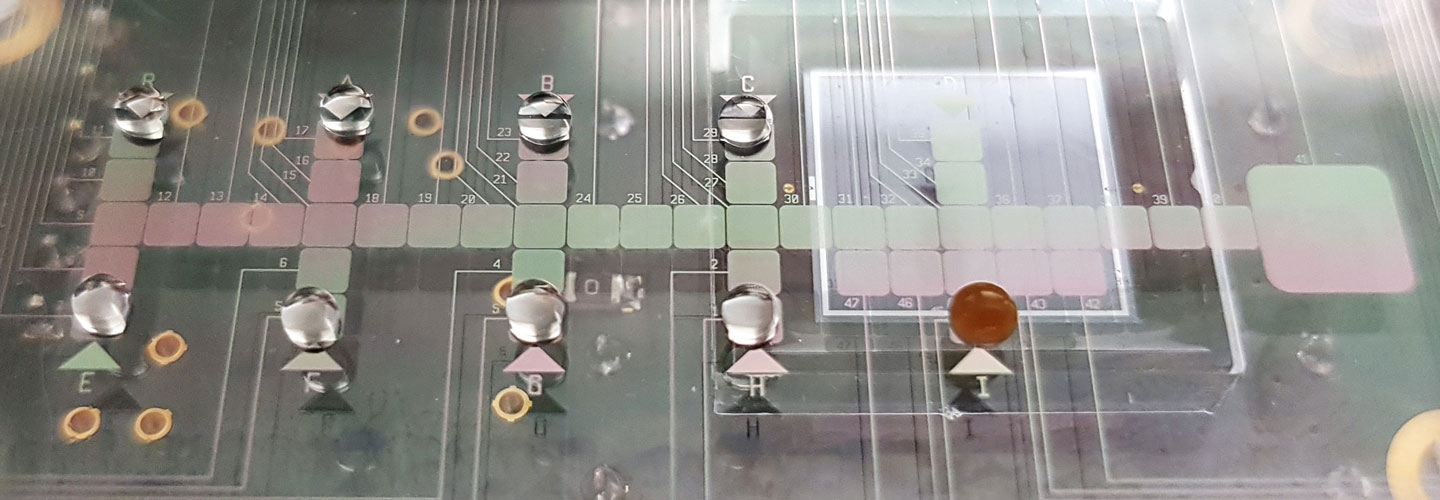Centre for Research in Biodetection Technologies (CRBT)
The Centre for Research in Biodetection Technologies is a multidisciplinary Research Centre exploiting the interfaces between two leading applier Research Groups in the University. Comprising the Particle Instrumentation & Diagnostics (PID) group, within the School of Physics, Astronomy & Mathematics (PAM), and the Microfluidic & Microengineering Research Group (MMRG).
The Research Centre brings together expertise in microfluidics, sample processing & handling, airborne collection & detection technologies (particle, biological and chemical), engineering design and integrated system development. As an exemplar of successful multi-disciplinary Research and Development, the Centre brings together expertise across Schools with research outputs across several of the University’s Research Themes leveraged by existing expertise spanning Food, Information & Security, Health & Wellbeing and Space.
At the basis of the Centre's activities lies the development of novel techniques and instruments that address new and emerging threats in biosecurity. Working collaboratively with national and international research organisations, the Centre conducts a spectrum of research from curiosity driven to applied R&D, the latter typically aiming to raise the Technology Readiness Level of biodetection research concepts and prototypes from TRL1/2/3 to TRL5/6.
The Centre also offers a unique environment for students to study across a range of disciplines, with interactions across lab-on-a-chip devices, molecular diagnostics, aerobiology, environmental sampling, system integration and the application of research techniques and methods to real-world environments.
Current biodetection R&D projects have a focus on the development of integrated systems incorporating autonomous airborne pathogen collect/detect systems, sample processing and handling, real-time analysis using DNA amplification and remote reporting, with a particular emphasis on early detection of biowarfare agents for the protection of military and civilian populations.

Ian Johnston
Centre Director
Associate Professor Ian Johnston is Director of the Centre for Research in Biodetection Technologies and Head of the Microfluidics & Microengineering Research Group in the School of Physics, Engineering and Computer Science at the University of Hertfordshire.
He leads on research, commercial and enterprise activities taking an active role in applied research, collaborative research and client engagement. Ian has a track record in successful, multidisciplinary research and contract collaborations between Industry, Academics and Research staff across the Engineering, Applied Physical Sciences and Technology spectrum. He graduated with a BSc in Physics from Leeds University before gaining his PhD from the University of Hertfordshire in 2001. He was a founding member of the Microfluidics & Microengineering Research Group and his subsequent work focusses on the rapid development of turn-key, fluid dynamics based, integrated biodetection systems.
The Centre conducts a spectrum of research from curiosity driven to applied R&D, the latter typically aiming to raise the Technology Readiness Level of biodetection research concepts and prototypes from TRL1/2/3 to TRL5/6. Clients include the UK MoD and the Defence Science & Technology Laboratory (Porton Down), with collaborators on Industry and Research Council funded projects including Optisense Ltd., Fera Science Ltd and Bayer CropScience, Phytoform Labs.
Meet the team
Get in touch
For more information about our work in Biodetection Technologies, please contact Assoc. Prof. Ian Johnston, CRBT Centre Director.
